| Srl | Item |
| 1 |
ID:
149823
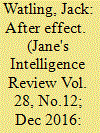

|
|
|
|
|
| Summary/Abstract |
Allied forces have begun the offensive to retake the northern Iraqai city of Mosul from the Islamic State. Reporting from Iraq, Jack Watling analyses how the successful recapture of the city will effect broader political and sectarian dynamics in the country.
|
|
|
|
|
|
|
|
|
|
|
|
|
|
|
|
| 2 |
ID:
149839
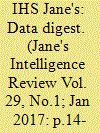

|
|
|
| 3 |
ID:
145940
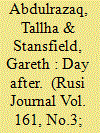

|
|
|
|
|
| Summary/Abstract |
Over recent months, the Islamic State (IS) in Syria and Iraq has lost territory to the Syrian army, opposition forces in Syria, the reorganised Iraqi Security Forces and the Hashed Al-Sha’bi (Popular Mobilization Forces – PMF), as well as to Kurdish Peshmerga forces in Iraq. These losses have led to heightened speculation that an assault on the IS stronghold of Mosul may happen sooner rather than later. However, with such speculation comes the fear of ‘the day after’, and what could be expected to happen in Mosul – a traditional focal point of Arab and Iraqi nationalists – and a city that was the centre of Iraq’s military establishment throughout the twentieth century. Tallha Abdulrazaq and Gareth Stansfield investigate this ‘day after’ question, highlighting the potential problems that may emerge following IS’s departure from the city.
|
|
|
|
|
|
|
|
|
|
|
|
|
|
|
|
| 4 |
ID:
174149
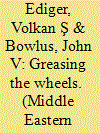

|
|
|
|
|
| Summary/Abstract |
In the 1880s, Germany cultivated an alliance with the Ottoman Empire that led to a concession to build one of history’s most storied, diplomatically contentious, and financially challenging infrastructure projects: the Berlin-Baghdad Railroad. While Germany had many goals in pursuing the project, oil was the only way to make the railroad economic. Drawing on Ottoman archival sources, this article examines the policies and strategies of Sultan Abdülhamid II in relation to Germany’s attempt to develop Mesopotamian oil from German Emperor Wilhelm II’s visit to Istanbul in 1889 to the conclusion of Germany’s oil concession in 1906/7. It argues that Hamid pursued a pragmatic policy to develop and protect Ottoman oil from being dominated by the powers, especially the British Empire, and, in the process, seeks to reorient our understanding of great power interest in Middle East oil.
|
|
|
|
|
|
|
|
|
|
|
|
|
|
|
|
| 5 |
ID:
098454
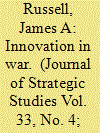

|
|
|
|
|
| Publication |
2010.
|
| Summary/Abstract |
This article analyzes operations by three battalions conducting counterinsurgency, or COIN, operations in Iraq over the period from July 2005 through March 2007: the 1st Battalion, 7th Marine Regiment (1-7) along the Iraq-Syrian border in the first half of 2006; the 1st Battalion, 37th Armored Regiment (1-37) battalion operating in south-central Ramadi in the fall of 2006; and the 2nd Battalion, 1st Infantry Regiment, or 2-1, operating in eastern Mosul in 2005-06. The empirical evidence presented in these cases suggest that, contrary to popular perceptions, the units successfully innovated in war - a process largely executed organically within the units themselves. Innovation is defined here as the development of new organizational capacities not initially present when the units deployed into the theater. The evidence presented in these cases suggests that the innovation process enabled these units to successfully transition from organizations structured and trained for conventional military operations to organizations that developed an array of new organizational capacities for full-spectrum combat operations. The units in this study developed these new capacitites largely on their own initiative.
|
|
|
|
|
|
|
|
|
|
|
|
|
|
|
|
| 6 |
ID:
131874
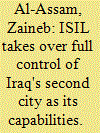

|
|
|